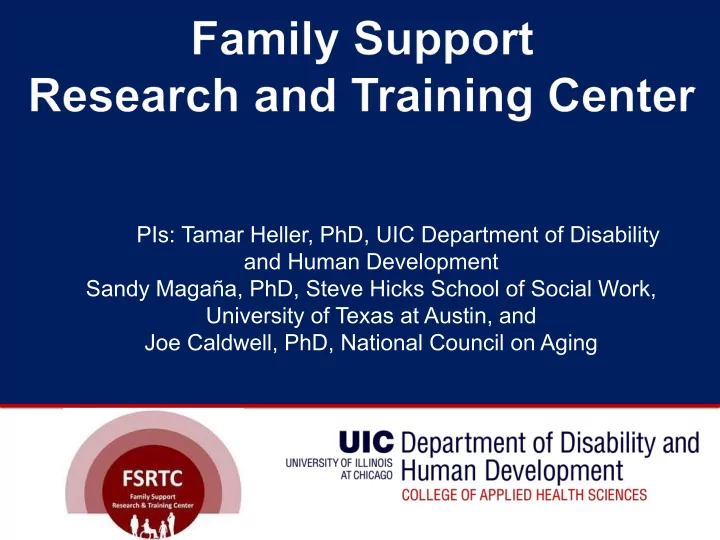

PIs: Tamar Heller, PhD, UIC Department of Disability and Human Development Sandy Magaña, PhD, Steve Hicks School of Social Work, University of Texas at Austin, and Joe Caldwell, PhD, National Council on Aging
Family Support Research and Training Center (FSRTC) at the University of Illinois at Chicago is funded by the United States Department of Health and Human Services, Administration for Community Living (ACL), National Institute on Disability, Independent Living, and Rehabilitation Research (NIDILRR) Grant # 90RT50320-01-00 . 10/1/2014-9/30/2019
Define the state of science on family support 1. Generate new knowledge in the critical policy areas 2. of self-direction and managed care; and in cultural competent peer-to-peer family interventions Generate and implement a vision for policy and 3. practice in family support through a national family support resource center Contribute to improvements in community living, 4. participation, health, function and other outcomes for individuals with disabilities who are supported by family members
� Research Partners � Technical Assistance and Dissemination � National council on Partners Aging � Lurie Institute for � Easter seals Disability Policy at � National Alliance for Brandeis University Caregiving � National Resource � Sibling Leadership Center for Participant Network Directed Services at � RTC on Community Boston College Living at the University of Minnesota
Development of a Strategic Plan for Family Support 1. Research Sandra Magaña, PI; Brian Grossman, Co-PI Identifying Promising Practices in Family Support 2. Services Joe Caldwell, PI; Katie Arnold, Co-PI Family Member Roles and Well-being in Self-directed 3. Waiver Programs Marji Erickson Warfield, PI; Susan Parish, Co-PI Understanding Experiences, Trends, and needs in 4. Self-Directed Support Programs Kevin Mahoney, PI; Ellen Mahoney, Co- PI Family Support in Managed Care 5. Tamar Heller, PI; Randall Owen, Co-PI Parents Taking Action: A parent training program for 6. Latino Families of children with ASD Sandra Magaña, PI, Miguel Morales, Co-PI
R1: Developing a National Strategic Plan For Family Support Research Sandy Magaña & Brian Grossman Short-term goal: � To gather input about family support (caregiving) research topics from multiple stakeholder groups � Focus on different stakeholders � Focus on people of color, racial/ethnic diversity � Focus on hearing from users (consumers) � Family broadly defined Long-term goal: � To develop a national family support research agenda
Engage stakeholders to provide research topics/questiona via Methods IdeaScale, phone, pen/paper Generate preliminary research topics Produce literature reviews Develop and implement stakeholder survey Generate initial research Survey stakeholders to priorities prioritize research topics/questions Identify and recruit Key panel of family support Reach consensus - Stakeholder Activity experts on research topics, areas, Convene stakeholders to - RRTC Staff Activity questions finalize prioritization - Outcome R1: Developing a Strategic Plan for Family Research
� Grossman, B., & Magaña, S. (2016). Introduction to the special issue: Family support of persons with disabilities across the life course. Journal of Family Social Work, 19 (4). � Vanegas, S. & Abdelrahim, R. (2016). Characterizing the systems of support for families of children with disabilities: A review of the literature. Journal of Family Social Work. 19 , 286-327. � Burke, M., Patton, K., & Lounds Taylor, J. (2016). Family Support: A review of the literature on families of adolescents with disabilities. Journal of Family Social Work. 19, 252-285. � Barrio, C., Hernandez, M., & Gaona, L. (2016). The family caregiving context among adults with disabilities: A review of the research on developmental disabilities, serious mental illness, an traumatic brain injury. Journal of Family Social Work. 19, 328-347. � Grossman, B. & Webb, C. (2016). Family support in late life: A review of the literature on aging, disability and family caregiving. Journal of Family Social Work. 19, 348-395.
� The goal is to identify promising practices in family support across disabilities and life course � Progress: � Created report on recommendations to improve data collection in national data � Completed environmental scan and expert workgroups to identify and assess promising practices (focused on 28 practices � Next steps � Preparing a report and webpage to highlight 28 practices � Additional practices can be added in the future � Will work on revising family support taxonomy
Recommend
More recommend